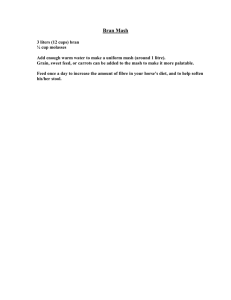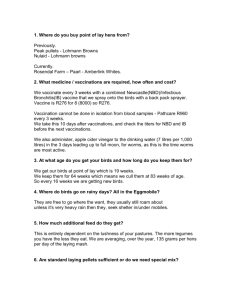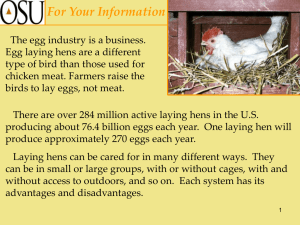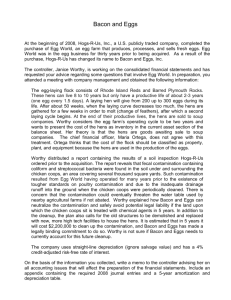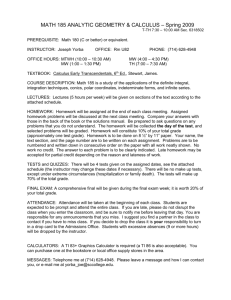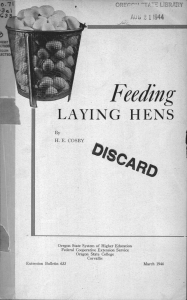Feeding LAYING HENS a. H. E. COSBY
advertisement
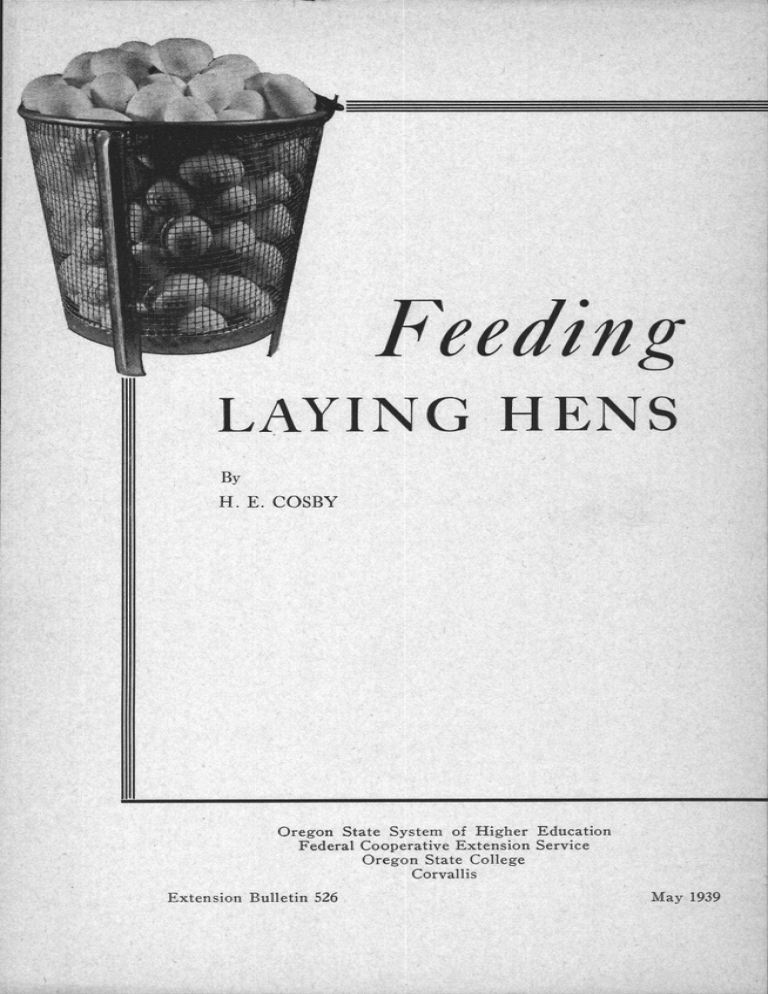
. a. Feeding LAYING HENS By H. E. COSBY Oregon State System of Higher Education Federal Cooperative Extension Service Oregon State College Corvallis Extension Bulletin 526 May 1939 TABLE OF CONTENTS Page Introduction Feeding Nutrients Content of Feeds Uses of Feeds Variety and Palatability Feeds for Egg Production Scratch Grains Mash Feeds Analysis and Vitamin Content Green Feed Effect of Feeds on Internal Egg Quality. Minerals Charcoal Water Milk Vitamin Feeding Feeding Methods Use of Scratch Grains Overfeeding Costly Constant Supply of Mash Advised Emergency Feeds May Be Needed Bringing Pullets into Lay Gain in Weight Essential Housing Range Pullets Good Judgment Needed Physical and Sexual Maturity Important Liberate in Morning Feeding Breeding Hens for Reproduction Feeding Requirements of Breeding Hens Effect of Breeder Ration on Chicks Vitamin Requirements of Breeding Hens Mineral Requirements of Breeding Hens O.S.C. Breeder Mash Individual Cages for Laying Hens Reasons for Increased Cage Interest History of Cages Advantages of Cages Disadvantages of Cages Recent 0.S.C. Cage Trials Feeding Birds in Cages Effect on Production of Second Year in Cages Effect of One Year's Confinement on Breeding Values Battery Equipment Used 3 3 3 4 4 4 4 5 6 6 6 7 7 7 8 8 8 8 9 9 10 10 10 10 10 11 11 11 11 12 12 12 13 13 14 14 15 15 15 16 16 16 Feeding Laying Hens H. E. COSBY Professor of Poultry Husbandry INTRODUCTION production of eggs for market is a marginal business in which only THE a relatively small profit per dozen is made by efficient operators. The margin of profit does not provide sufficient leeway to justify the individual poultryman experimenting with feeds or methods of feeding. Until experience warrants, the producer will have better success by accepting proved feed combinations and adhering closely to some definite, approved method of feeding a properly balanced ration. Feed represents the largest item of cost in the business of producing eggs. Mass production practices, increased egg production per hen, year- round confinement of laying stock in houses and batteries, and many other artificial deviations from former natural methods have increased the complexity of the problem. Recent experimental findings in the field of poultry nutrition have kept pace with the changing conditions and provide ample protection for the producer's investment so far as the feeding phase of his business is concerned. Oregon for more than two decades has been producing a surplus of eggs that must compete on a specified quality basis at distant terminal markets with eggs from all producing areas of the country. The price per dozen is determined by the quality of eggs at the eastern markets to which Oregon eggs are shipped. Careless uses of certain feeds and other faulty management practices are known to have objectionable effects on interior egg quality. As quality is lowered, price is lowered, and, since the products of all producers of this state are on a competitive export basis, the industry must be alert in avoiding damage to the reputation of its products. FEED NUTRIENTS Content of feeds. Both feeds and eggs contain the same nutrients; namely, proteins, carbohydrates, fats, minerals, vitamins, and water. The proportion of each food nutrient varies in different feeds and the poultryman's aim must be to furnish the correct supply of each for egg manufacture. Only a portion of each nutrient found in poultry feeds is capable of being assimilated by the birds, hence a variation between the actual feeding value and the chemical analyses. For example, one feed may contain a large amount of fiber which will affect the digestibility or availability of other nutrients present. Some proteins are more complete for the required amino acids than others; consequently their feeding value is greater, though the chemical analysis would show them to be the same.' 3 4 EXTENSION BULLETIN 526 Most grain feeds supply carbohydrates and fats in relatively large amounts but do not contain a large supply of either proteins or minerals. Grains alone do not constitute a balanced ration for egg production since they are deficient in quantity as well as quality of the proteins involved in egg manufacture. They are deficient also in the quantity of minerals. To supply this deficiency the grain feeds must be supplemented- by a mash composed of mill by-products; ground grains; high protein concentrates such as fish meal, meat meal, milk products, and oil meal; mineral ingredients such as oystershell flour, bone meal, and salt; and vitamin supplements. Uses of feeds. The first use of feed by the hen is for body maintenance, approximately 75 per cent of her normal feed intake being used for this purpose. A limited supply of feed, therefore, might be no more than sufficient to maintain the body. Eggs are manufactured by the hen from the liberal supply of balanced feeds consumed in excess of body requirements. A laying hen will deplete her body of reserve nutrients only to a limited extent and then cease production. Hence it becomes apparent that it is necessary to keep before her a reasonably constant supply of the essential feeds in order that she will not have to resort to this reserve. Variety and palatability. A combination of several feeds permits the deficiencies of one to be made up from the nutrients in others. Palatability of feeds is important. Little is gained if through lack of palatability the feeds supplied are not consumed in sufficient amounts for heavy production. A variety of feeds aids in palatability by reducing the monotony of the diet. FEEDS FOR EGG PRODUCTION Scratch grains. Oregon produces a surplus of high-quality wheat, oats, and barley and a generous use of these home-grown feeds should be made. The production of corn is rapidly increasing but does not meet the demand. A heavy tonnage of corn is imported into the state and high transportation costs must be absorbed. Wheat is one of the best poultry grains. It is almost as fattening as corn and generally available in all parts of the state at a more reasonable price than some other grains. It is high in carbohydrates and low in fiber and minerals. Heavy, thin-hulled oats have a high feed value. They are not as palatable as wheat or corn, probably because of their higher fiber content. Oats have a tendency to reduce the cannibalistic habits of chickens but should not be used in excess of 25 per cent of the scratch grain by weight. Barley is a fattening grain but contains less fiber than oats. It may be substituted for oats in the scratch feed or it may replace 50 per cent of the corn in the scratch grains. Barley is less palatable than corn, wheat, or oats, and poultrymen should gradually teach the birds to eat it, rather than to make a sudden incorporation of it in the ration. Poultrymen generally prefer the Hannchen barley to feed whole because the objectionable awns are knocked off in threshing. Some of the more heavily bearded varieties may be rolled before feeding. Yellow corn is the most palatable grain generally used. It furnishes carbohydrates and fats most economically. It is a good source of vitamin FEEDING LAYING HENS 5 A. When purchased for poultry feed purposes it should not be of a grade lower than No. 2. Kaffir, milo, buckwheat, and other less common grains are not generally available in Oregon in sufficient tonnage to make them economical feeds, though when available at reasonable prices they are satisfactory. A scratch grain mixture is determined more by availability and prices of ingredients than by any set formula. It should contain in palatable pro- portions not less than two different kinds of grains. Three suggested scratch mixtures for laying hens are listed below and the selection or variation of any one of them may depend on local conditions. (1) Scratch Mixtures for Laying Hens (2) (3)* 1,000 pounds wheat 600 pounds whole or cracked yellow corn 400 pounds oats 1,000 pounds wheat 300 pounds corn 300 pounds barley 400 pounds oats 1,200 pounds wheat 400 pounds oats 400 pounds barley 2,000 pounds 2,000 pounds 2,000 pounds Mash feeds. Formerly a high percentage of the base of mash mixtures consisted of by-products of grains. The recent tendency involves the more liberal use of reasonably coarse-ground whole grains. Since no combination of grains or their by-products supplies the necessary nutrients for egg production, it is necessary to supplement these with feeds high in protein, minerals, and vitamins. 0. S. C. Laying Mash Formula Millrun 320 Ground Wheat 400 Ground Yellow Corn 400 Gfound Oats 200 Ground Barley 100 Meat Meal 200 Fish Meal 100 Dry Skim Milk 100 Alfalfa Leaf Meal 100 Linseed Oil Meal 20 Steam Bone Meal 10 Oystershell Flour 20 Salt 20 Vitamin-bearing fish oil containing 400 D-3,000 A units per gram or the equivalent amounts of oils of other potencies 811,998 pounds Yellow corn supplies a reasonable amount of vitamin A and where a normal amount in the scratch feed is reduced or eliminated, it is necessary to supply additional supplemental sources of vitamin A. t A high grade of biologically tested vitamin D oil should be added to the mash mix- ture. Under average conditions an oil having a vitamin D strength equivalent to that of U. S. P. cod-liver oil should be used at the rate of it per cent of the total mash mixture. Vitamin D concentrates or other oils should be incorporated in the mash in proportionate amounts. 6 EXTENSION BULLETIN 526 There are endless combinations of ingredients and amounts of each that may be used in meeting the nutritional requirements of laying hens. The following mash mixture, based upon availability and economy of ingredients, has been proved adequate under both experimental and commercial conditions at the Oregon Agricultural Experiment Station: ANALYSIS AND VITAMIN CONTENT The analyses of mashes vary in accordance with the composition and quality of the ingredients used. The 0. S. C. Laying Mash has approximately the following analysis and vitamin content: Analysis of Mash in Per Cent 19.96 Protein 4.25 Fat 4.66 Fiber Calcium Phosphorus N. F. E. 1.82 1.09 51.96 Vitamin Content of Mash (Units per 100 lbs. of Mash) 908,400 Vitamin A 72,640 Vitamin D 142,783 Vitamin G 00.85 Filterate Factor Green feed. Kale and alfalfa, supplemented with green oats and vetch in the spring before the alfalfa hay is ready for cutting, give a continuous green feed supply throughout the year west of the Cascade Range. Green and dry alfalfa will supply the necessary green feed in Central and Eastern Oregon. For each one hundred birds 5 or 6 pounds of succulent green feed daily, run through a cutter, will be a satisfactory amount. Too large a consumption of green feed may cut down the mash and grain consumed, resulting in a drop in egg production; it may also make dark-colored yolks, undesirable on the commercial market. The sprouting of grains for green feed is not advised. Mangel beets and carrots, while not strictly green feeds, do supply succulence, help to keep the birds occupied, and tend to prevent such vices as feather eating and cannibalism. Carrots are high in vitamin A content, and unlike green vegetation, do not supply the pigment causing darkcolored yolks. The dried alfalfa content regularly incorporated in the mash may be reduced 50 per cent where succulent green feed is fed regularly each day. It is not wise entirely to eliminate dried greens from the mash. Unfavorable weather may reduce the succulent supply and a lowered production may occur during the necessary interim in making adjustment of nutritional needs and palatability of the mash. Effect of feeds on internal egg quality. Excessive feeding of highly pigmented feeds such as kale, rape, rye pasture, yellow corn, and certain weeds like Shepherd's purse, mustard, and penny cress will give an undesirable deep color to the egg yolk. A large percentage of cottonseed meal in FEEDING LAYING HENS 7 the ration will result in yolk color for storage eggs varying from salmon and dark green to nearly black, and the whites will vary from normal color to pink. The excessive feeding of onions, fish, and fish oils may give the eggs an undesirable flavor. Minerals. Minerals are one of the six vital nutrient factors. Unless care is taken that there is a sufficient supply of those needed, egg production may decrease. The feeding of minerals is vastly more important under the present intensive poultry-keeping conditions than formerly under small-flock and free-range conditions. Grains and their by-products are low in minerals and must be supple- mented with ingredients of higher mineral content. They do not supply calcium, phosphorus, sodium, and chlorine in adequate amounts. A number of other minerals are of vital importance but are supplied in sufficient amounts by the ordinary ration. For example, iron usually is found with the vitamin supply and iodine is provided by fish meal and oystershell. Oystershell kept before the birds in hoppers all the time supplies the much-needed calcium carbonate for eggshells. Bone meal or granulated bone is fed primarily to supply phosphorus. Salt supplies sodium and chlorine and is added to the mash at the rate of 1 per cent of the total mash mixture. Care should be taken that it is evenly distributed through- out the mash. Grit is fed in separate troughs. A hard acid insoluble grit is preferred by many poultrymen because it lasts longer and aids in breaking down feeds high in fiber. Others use the soluble limestone grit because, like oystershell, it supplies calcium. In the use of limestone grit, caution must be exercised in avoiding excess magnesium, which is sometimes found in strata of limestone called dolomites. Charcoal. Chickens eat charcoal readily, and although the necessity of charcoal has been questioned by some authorities, there is no experimental evidence proving it to be harmful or unnecessary. It is recommended that charcoal, if fed, be kept in hoppers before the birds at all times. Water. As both the fowl's body and the egg are high in water content a good supply of water is imperative. An egg contains approximately 67 per cent water. Milk. Milk contains highly digestible proteins, minerals, and valuable vitamins. Liquid skim milk or buttermilk contains about 10 per cent solids; condensed buttermilk about 30 per cent; and dried milk about 90 per cent. On this basis 1 pound of dried milk is equivalent to approximately 3 pounds of semisolid or 9 pounds of fresh skim milk, the relative economy being determined largely by the price. The choice of milk products will depend on the available supply. Liquid skim milk or buttermilk furnishes the milk solids at a lower cost per pound than either the semisolid or dried-milk products. Dried buttermilk or dried skim milk may be included in the mash at the rate of 5 to 10 per cent of the mixture when liquid milk or its equivalent is not available. On farms where it is both desirable and economical to utilize liquid milk, the dried-milk ingredient of the egg mash formula given on page 5 may be omitted. Less animal protein concentrates are needed when an ample supply of liquid milk is available for laying fowls; therefore, one EXTENSION BULLETIN 526 8 hundred pounds of the meat meal content may be omitted when a daily minimum of 3 gallons of milk for each hundred hens is provided. Ground grains to the extent of 200 pounds may be added to the mash to replace the poundages of milk and meat meal omitted. Vitamin feeding. Vitamins are found only in natural products and cannot for the most part be synthesized by birds, though they do have the ability to store limited amounts. Vitamins are designated by letters of the alphabet in the order in which they were discoveredA, B, C, etc. Of these several food factors that play so vital a part in nutrition, only three have an important bearing in feeding for egg production; namely, A, D, and G (Riboflavin). The other vitamins either are present in sufficient quantity in the usual feeds or do not affect poultry. VITAMIN A is well supplied in green feed, particularly in thin, leafy vege- tation. Alfalfa is a good source, while yellow corn and some fish oils supply liberal amounts. The lack of vitamin A causes eye trouble and reduces egg production. VITAMIN D is present in certain fish oils, ultraviolet light, sunlight, and some other commercial products. The vitamin strength of oils varies but the vitamin D does not deteriorate in mixed feeds as rapidly as vitamin A. The need for oil is greater in cloudy, rainy weather or when birds are closely confined in houses not admitting direct sunlight. The device of irradiating poultry feeds with ultraviolet light has not yet proved practical. The presence of vitamin D promotes better health and stronger eggshells. The lack of it results in poor utilization of calcium and phosphorus, faulty bone formation, and leg weakness. VITAMIN G or Riboflavin is found most abundantly in dried-liver meals, yeast, dried-milk products, alfalfa-leaf meals, fish meals, and meat scraps. The presence of this vitamin in suitable amounts in a laying ration not only improves egg production, but is particularly desirable for the production of eggs that are to be saved for hatching purposes, as will be pointed out later. FEEDING METHODS Use of scratch grains. Scratch grain usually is fed both in the morning and evening. Approximately 3 pounds per one hundred birds is fed in the morning and all they will consume in the evening. Daily consumption of one hundred White Leghorn hens will be approximately 10 to 15 pounds of grain. The consumption of grain frequently will vary from day to day in accordance with the appetites of the chickens. There is an even wider variation with the rate of production, seasonal temperatures, and length of days. Overfeeding costly. The overfeeding of grain dulls the appetite of fowls and soon will result in a decreased consumption of feed and an inevitable drop in egg production. By careful examination of the litter for uneaten grain, the thorough poultryman will learn whether excess grain has been fed. Laying hens should go to roost with full crops. An examination of the crops of several birds at night may indicate to the poultryman whether additional feed is advisable. 9 FEEDING LAYING HENS Constant supply of mash advised. Dry mash should be available in mash troughs at all times. The 0. S. C. mash trough holds only a few days' supply, necessitating frequent fillings and thereby insuring a fresh supply of mash and the opportunity to check on its consumption. Figure 1. O.S.C. Experimental Laying Cages. Total annual consumption and varying conditions governing daily consumption of mash are similar to those for grain. The economical use of mash is influenced by the amount of mashtrough space provided. Insufficient trough space promotes crowding and reduces consumption of feed. The following are practical suggestions for the number of lineal feet of dry-mash trough space: Number of Hens Number of 0. S. C. Mash Troughs Suggested 100 2 200 250 400 500 3 4 6 8 Feeding Space Provided Per 100 Hens 28 feet 21 feet 22 feet 21 feet 22 feet Emergency feeds may be needed. Occasionally it is necessary to vary the routine method of feeding by supplementing more appetizing feeds in order to increase the fowls' intake of food to meet such emergencies as sharp reductions in production, partial molts, sluggish appetites, attempts to hold up production through the molting season, and unfavorable temperature conditions. Mash moistened with milk is an excellent emergency feed. It should be given in an amount that the hens will consume eagerly in 20 minutes, 10 EXTENSION BULLETIN 526 usually about 2 pounds of mash per one hundred birds. The moist mash may be fed in the middle of the day or after the evening grain feed. Rolled barley soaked over night in milk is an emergency feed that also aids in restoring normal appetites and increased body flesh. Green-cut bone fed three or four times a week at the rate of 3 or 4 pounds to one hundred hens is a stimulating feed that aids in getting fowls back into production. Liberal feeding of additional succulent greens or root crops during slumps in production is advisable. Any one of the various feeds used as an emergency feed should be gradually discontinued when the desired results from its use have been obtained. Bringing pullets into lay. Three or four weeks before the pullets are moved into the laying house, the laying mash to be used may replace an additional fourth of the developing mash each successive week so that the mature pullets are on a full laying ration at the time they are housed. This practice is sound because it reduces the hazards of making too many major changes at the time of housing. Pullets should be fed liberally on green feed while coming into production. The practice should be continued after housing and until they are producing eggs of high enough grades to warrant a reduction of green feed in the interest of less yolk coloring. Succulent green feed promotes a laxative condition that is not favorable for prolapsis trouble. Because it keeps the pullets occupied such feed is also an aid in preventing cannibalism. Gain in weight essential. Under normal conditions of growth a flock of production bred pullets will lay from 20 to 30 per cent at six months of age. Many disappointments caused by drops in production and partial molts may be avoided by feeding pullets with the understanding they have not reached their mature weight. Pullets should gain in weight each of the first few months after they come into production. Grain is fed liberally during the shorter and colder days of fall and early winter in order to meet the demands of growth, egg production, and body maintenance of the pullets. As production increases, the feed intake must increase, because the birds cannot long draw on body reserves. Daily consumption of grain occasionally may reach or exceed 15 pounds per one hundred pullets during the period of growth and increased production. The grain may be reduced to approximately 12 pounds daily after the birds are older and more mature. The amount of mash consumed during the early fall months of lay is not quite equal to the grain consumed. The mash is kept before the pullets in hoppers at all times. As pullets do not carry a vitamin D reserve long after being brought in from sunshine conditions of the range, the mash ration must contain an adequate supply of vitamin D oil, or egg production will drop off rapidly. HOUSING RANGE PULLETS Good judgment needed. Transferring pullets from the freedom of the range to confinement in laying quarters requires good judgment, if adverse conditions of production and cannibalistic habits are to be kept at a minimum. Physical and sexual maturity important. Pullets should be housed according to their physical and sexual maturity. Any normal flock of FEEDING LAYING HENS 11 pullets of the same age will mature in three groups: first, the early maturing individuals; second, the greater number or average of the flock; and third, the slower maturing ones. To house these three grades of pullets at the same time and in the same room frequently is an expensive mistake. Liberate in morning. The pullets should be liberated in the laying house during the early morning. This practice affords the opportunity for them to get familiar with their new quarters and the caretaker prior to roosting time. Thus, piling up at night because the environment seems strange is avoided. Range houses should be equipped with a few nests for those pullets that lay before being moved into permanent houses. Pullets that form the habit of laying on the floor or ground while on range become easy prey for cannibalistic and curious mates when they continue the habit in the more crowded laying house. Pullets should not be moved into the confinement of a laying house during extremely warm and low-humidity weather because they are then restless and more likely to develop cannibalism than under cooler weather conditions. An outside yard should be provided both as a measure of prevention of cannibalism and as an emergency in the event it does develop. Use of the yard should begin if necessary as soon as the pullets are familiar with the house, and should continue until the birds have adjusted themselves to their new environment. FEEDING BREEDING HENS FOR REPRODUCTION Feeding requirements of breeding hens. A better ration is required to meet the needs of hens producing hatchable eggs than for the flocks fed only for the production of commercial eggs. The ordinary egg mash does not meet the needs of the breeding flock. Commercial egg production can be obtained on rations cheaper in cost than breeder mashes. Increased interest in the vitamin food value of eggs and greater emphasis on ways of reducing the mortality in commercial laying flocks have resulted in many poultrymen using the better vitamin fortified breeder mashes for commercial laying flocks as well as breeding flocks. In former years most of the chicks were hatched under hens or in small incubators on the farms. The recent trend towards hatchery expansion and centralization has created a greater need for better feeding of breeding flocks. Under present day practices of mass production chicks are hatched at all seasons of the year. The former conditions of small flocks having access to succulent green ranges, sunshine, and spring conditions must be duplicated today by better rations. The range must supply or the feeders must provide breeder rations that will meet the requirements for body maintenance of the hen, supply the necessary nutrients for the production of eggs, and furnish all the essential nutrients in such liberal amounts that enough of each of them can be carried over into the hatching eggs to meet the demands of the growing embryos. In addition, the yolk of the egg in the abdomen of the newly hatched chick must still contain sufficient minerals, vitamins, pro teins, and fats to maintain normal development until the chick is able to assimilate the nutrients from an intelligently compounded chick-starting ration. Effect of breeder ration on chicks. The specialized poultry breeder or hatclaerman cannot afford to incubate eggs from flocks that have not been 12 EXTENSION BULLETIN 526 fed a ration supplying all the necessary nutrients for maximum hatchability and livability of the chicks. The chick-buying public cannot afford to invest money in chicks that develop at an early age such trouble as dermatitis, paralysis of the toes and perosis because of a deficiency diet of the parent stock. The mere fact that a flock maintains high egg production on an egg mash is no evidence that high hatchability or strong chicks will result. Vitamin requirements of breeding hens. The vitamin requirements for chicks are quite definitely known, and successful rations today should be compounded in accordance with this knowledge. The breeder hens require greater amounts of vitamins A, D, and G than are required by commercial laying hens. Vitamins B and E, both widely distributed in the cereal grains, present no dangers of deficiency. Vitamin C requirements of the hen are very low and the amount needed is apparently synthesized by her. Mineral requirements of breeding hens. The mineral requirements of breeding hens are not materially different from the requirements necessary in maintaining high production of commercial layers, with the possible exception of manganese. The amount of minerals added to a mash depends entirely on the knowledge of the necessary minerals already present from such ingredients as fish meal, meat scraps, milk, grains, and greens. A ration deficient in the necessary minerals as well as a ration containing excessive amounts will result in definitely lowered hatchability. Oystershell or high-grade limestone should be kept before the birds on a free choice basis in addition to grit in the same routine management followed with the commercially fed flock. The breeding hen requires a greater amount of manganese than the commercial layer. A very definite reduction in hatchability of eggs occurs on any ration deficient in manganese. Embryos die in the shells with abnormal formations when an insufficient supply of manganese is provided. A deficiency of this necessary element in the breeder's mash tends to predispose the baby chick to a disease of the bones known as perosis, or slipped tendon as it is most commonly spoken of, and apparently no added amount of manganese to the chick's diet for the first eight of ten days will avert this disorder. The excessive use of bone meal and calcium carbonate products aggravates the perosis tendencies in chicks, and such excesses also interfere with the normal assimilation of manganese in the diet. The addition of manganese to the diet of the breeding hen or growing chick has little preventive or curative value unless the ration as compounded maintains a correct ration between the phosphorus and calcium content. A reasonably adequate amount of manganese for breeding flocks that have daily access to succulent green feed is contained in the 0. S. C. breeder mash. Where succulent greens are not available it would not be amiss for poultrymen to add pound of manganese sulphate to each ton of the breeder mash mixed according to the following formula. 0. S. C. breeder mash. The 0. S. C. breeder mash carries a safety margin of each of the necessary nutritional factors. This margin is necessary in any breeder mash to make allowances for deterioration, variation in the requirements of individual hens, and the necessity of building up the bodies of hens in some flocks that did not receive the necessary ration FEEDING LAYING HENS 13 far enough in advance of the time eggs were saved for hatching. The mash has been proved adequate both under experimental and commercial breeding-flock conditions by the Oregon Agricultural Experiment Station. 0. S. C. Breeder Mash Formula 300 Bran 350 Ground Wheat 400 Ground Yellow Corn 200 Ground Oats 100 Ground Barley 100 Meat Meal 125 Fish Meal 80 Dry Skim Milk 100 Dried Whey 150 Alfalfa-leaf Meal 30 Linseed-oil Meal 40 Steam-bone Meal 10 Oystershell Flour 20 Salt Vitamin-bearing fish oil containing 400 D-3000 A 10 units per gram (or the equivalent amounts of vitamin D oils of other potencies) 2,015 pounds Analysis of Breeder Mash in Per cent* Protein Fat Fiber Calcium 18.60% 3.92% 4.95% 1.83% 1.18% 53.50% Phosphorus N.F.E. Vitamin Content of Breeder Mash (Units per 100 lbs)* 1,194,600 Vitamin A 90,800 Vitamin D 203,165 Vitamin G Filtrate Factor 1.13 INDIVIDUAL CAGES FOR LAYING HENS Reasons for increased cage interest. Interest in the comparatively new practice in keeping laying hens in individual cages or batteries has increased during recent years. This method of keeping hens in solitary confinement has been accompanied by information, misunderstandings, successes, and failures as might be expected. The effort to reduce mortality in the pullet laying flock by keeping each pullet in a separate, sanitary compartment has been responsible in part for the interest and expansion. Certain poultrymen have become enthusiastic over the belief that more hens could be cared for in cages with less labor than under commercial housing conditions. Others have been interested in this method of management because of the possibility of using buildings, storerooms, garages and sheds not otherwise suitable for commercial housing of laying hens. Still others have felt that battery .This will vary slightly with the ingredients used. 14 EXTENSION BULLETIN 526 equipment would enable them inexpensively to enter the poultry business and supplement the family income without the need of much background information or experience. Some poultry breeders use cages in lieu of the trap nests during the pullet year as a basis for selecting the breeding hens for subsequent years. Others are interested as the result of advertising appeal, as a cure-all for previous adversities, and still further because the idea is novel and new. History of cages. Individual cages for laying hens have been used for many years in experimental, investigational, and laboratory work. Much of the knowledge of nutrition and disease control used today in commercial poultry farm management owes its existence to the investigators who developed cages for the segregation of individual fowls under study. Figure 2. Floor Pen Check Against Laying Cages. The commercial use of cages has been successful by those who made a very thorough study and analysis of the many involved problems prior to construction, installation of equipment, and its operation. Advantages of cages. Laying batteries have certain advantages. The problem of culling out birds of poor performance is made easy by the observation and production record of each individual. Losses from cannibalistic habits are eliminated and the egg production record of each hen is obtained with less labor than with trap nests. Birds that show evidence of a breakdown may be salvaged more quickly and economically than with similar birds running in large flocks. Losses from certain species of coccidia are lessened because of the sanitary environment in which the hens live. The battery house when properly planned for definite equipment will accommodate a greater number of hens than the same investment might otherwise provide. Each empty cage resulting from mortality, slaughter, or culling of its occupant has the distinct advantage of impressing the FEEDING LAYING HENS 15 owner with the fact that he is still concerned with the more vital problems involved in improving his breeding, nutrition, and management practices. The advantage or disadvantage of labor is determined by the nature of the installation of equipment and is subject to wide variations. Disadvantages of cages. The use of individual cages for laying hens has the disadvantage of being doomed for more certain failure than commercially housed and yarded birds, unless the caretaker is a careful student of the nutritional needs of hens kept in that manner. Infectious colds are more likely to be a problem under such concentration unless an efficient system of ventilation is installed and reasonable quarantine measures exercised with respect to visitors, used equipment, and introduction of new birds at all seasons of the year as replacement stock for those cages left empty. Nephritis may be a cause of serious loss with birds consuming rich feeds and getting but little exercise. Evidence from many sources indicates that there is a wide variation in the ability of different strains of hens of the same breed to stand the solitary confinement of individual cages. The permanency of individual cage equipment for those who have it and for the many who plan to install it depends much upon the breeding and rearing back of the pullets that are to occupy the cages. Recent 0. S. C. cage trials. During the past four years the Oregon Agricultural Experiment Station has made a study of the use of individual cages for laying hens. The equipment was installed the first two years in an 0. S. C. laying house and careful comparisons were made each year with birds of the same age and breeding kept under regular commercial housing conditions. The average egg production per hen for each of these years was consistently higher for the birds kept in the regular commercial laying house than for those kept in the individual cages. It became apparent that the temperature and ventilation factors of the battery room showed such wide fluctuations that uniform production could not be maintained during either cold or hot weather. Under the conditions of housing and equipment used there was no saving of labor in comparison to the commercially managed hens. The difference in mortality between the battery- and floorkept birds was slight and not significant. A new battery room and floor check pens were constructed in which especial attention was given to insulation and a system of forced ventilation. An experimental unit of 240 individual cages was installed. During the past two years the results obtained in these cages have been comparable to the results obtained from check pen floor birds similarly fed and of the same breeding and age. The production has been higher and more uniform throughout the past 2 years under these satisfactory housing conditions than in either of the first 2 years in the building not suited for this type of equipment. The average egg production per hen in the cages has been on a parity with that of the birds in the check pens. The difference in mortality of birds in the cages and in the commercially managed units was not significant. There was no economy of labor in caring for the birds in the batteries as compared to similar numbers of pullets in the regular floor check pens, but this relationship does not necessarily apply to all types and sizes of commercial installations. Feeding birds in cages. The hens in individual laying cages are fed the same egg mash and scratch grains recommended in this bulletin for commercial flocks with the exception that the birds in the batteries get an increased proportion of vitamins A and D in the mash through the medium 16 EXTENSION BULLETIN 526 of an additional amount of vitamin-bearing fish oil. Twelve pounds of 400 D and 3000 A unit potency or its equivalent in other fish oils is fed as compared to 8 pounds or its equivalent recommended for commercially housed layers. The birds are given one daily feeding of scratch grain. At night the grain is fed on top of the mash in an amount that the birds will readily clean up. In addition to the mash and grain feeds the birds have free access to acid insoluble grit, oystershell and fresh water. Effect on production of second year in cages. One battery unit of hens, after completing one year's confinement in cages, was held in the same compartments for the second consecutive year. Another battery unit of hens, after one year's confinement, was removed to commercial laying houses equipped with wire porches where they were held during their second production year. The average egg production during the second year of the hens held under commercial housing conditions was much greater than for the hens held in the cages. The hens kept in the battery completed their molt and returned to production a little sooner than those that molted on the floor. This difference was probably due to the fact that no competition for food existed among the battery birds. Effect of one year's confinement on breeding value. The advisability or inadvisability of using for breeding purposes hens that have spent one year in cages is a pertinent industry problem. One group of hens was held in the battery during the second consecutive year and was stud mated with the same males used with another group of hens held under floor conditions after one year's confinement. The fertility was low with the stud-mated battery hens but the percentage hatchability of the fertile eggs was normal. Under the more natural environment that prevailed with the commercially housed ex-battery birds the fertility and hatchability were commercially satisfactory. Investigations indicate that birds may be used successfully as breeders if given normal liberty after one year's confinement. Battery equipment used. The Oregon Agricultural Experiment Station has so far used only commercially made battery equipment. Satisfactory individual-cage equipment is available from both Oregon and outof-state manufacturers at a very reasonable cost per hen unit. Until the more vital problems of nutrition, breeding, and management are better understood, this station will not develop or publish plans for the construction of home-made battery equipment. The work and experience thus far indicate the importance of installing laying batteries only in rooms in which reasonable control may be had of temperature and ventilation. If these environmental factors are under control, the practice of keeping hens in individual cages should meet with reasonable success, if the breeding, rearing, nutritional, and management factors are reasonably correct. Cooperative Extension Work in Agriculture and Home Economics Wm. A. Schoenfeld, Director Oregon State Agricultural College and United States Department of Agriculture, Cooperating Printed and distributed in furtherance of the Acts of Congress of May 8 and June 30, 1914
